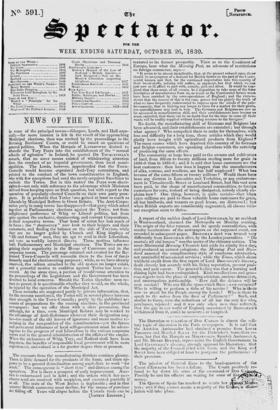NEWS OF THE WEEK.
IN some of the principal towns—Glasgow, Leeds, and Hull espe- dally—far more interest is felt in the result of the approaching Municipal elections, than was excited by the proceedings in the Revising Barristers' Courts, or could be raised on questions of general politics. 'When the Marquis of LANSDOWNE desired to wheedle the Tory Peers into the establishment of the " normal schools of agitation" in Ireland, he quoted DE TOCQUEVILLE'S remark, that no surer means existed of withdrawing attention from the conduct of an imperial government, than local muni- eipalities. The Lords, however, apprehended that the Town- Councils would become organized Anti-Tory committees, and pointed to the conduct of the town constituencies in England, who with few exceptions had used the newly-acquired franchises to exclude the Tories. But in this matter the Peers were short- sighted—not only with reference to the advantage which Ministers derived from keeping open an Irish question, but with regard tp the operation of popularly-elected Councils"on their own party pros- pects. It is probable that Tories have gained at least as much as Liberals by Municipal Reform in Great Britain. The Anti-Corpo- ration party in many towns has disappeared—that party which acted together at Parliamentary elections against the Tories, not from enlightened preference of Whig or Liberal politics, but front spite against the exclusive, domineering, and corrupt Corporations, in their respective towns. That bond of union has lost much of its force; the " shopocracy " now look to their ledgers and their customers, and finding the balance on the side of Toryism, while they are no longer galled by Church and King displays of "life and fortune" men, they are apt to cool in their Liberalism, and vote as worldly interest directs. These motives influence both Parliamentary and Municipal elections. The Tories are re- gaining their superiority in the House of Commons and in the corporate towns. The patronage retained and created for the Re- formed Town-Councils will reconcile them to the loss of funds formerly used for electioneering purposes ; while, as we have already observed, the odium attached to the old system no longer exists, and a powerful motive to coalition against Tories has been re- moved. At the same time, a portion of troublesome attention to the proceedings of the Legislature and the Government has been diverted to local concerns. Should the Tories therefore soon re- turn to power, it is questionable whether they would, on the whole, be injured by the operation of the Municipal Act.
These remarks are suggested partly by private information, that, for the reasons mentioned, the Tories will in several places increase their strength in the Town-Councils; partly by the published ac- counts of preparations for the coining elections, in the provincial newspapers: but we offer them with a clear persuasion, that although, for a time, even Municipal Reform may be worked to the advantage of Anti-Reformers whatever their designation may be—too much of the old leaven of ignorance and mean motive re- maining in the composition of the constituencies—yet the future and permanent influences of local self-government must be advan- tageous to the progress of real Liberalism in the various corporate towns and in the general administration of the affairs of the empire. %% hen the nicknames of Whig, Tory, and Radical shall have been forgotten, the benefits of responsible local government will be more experienced, and-valued in a for greater degree than at present.


























